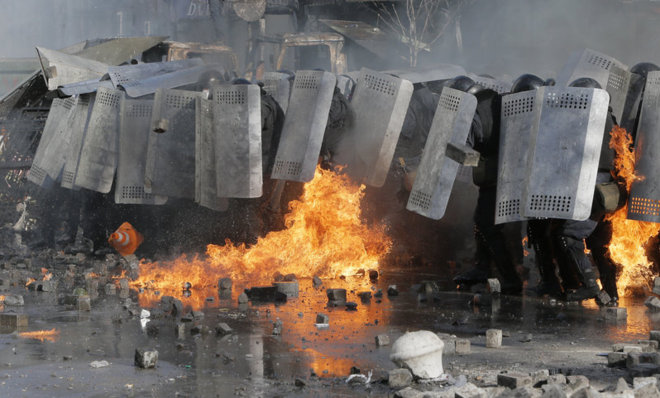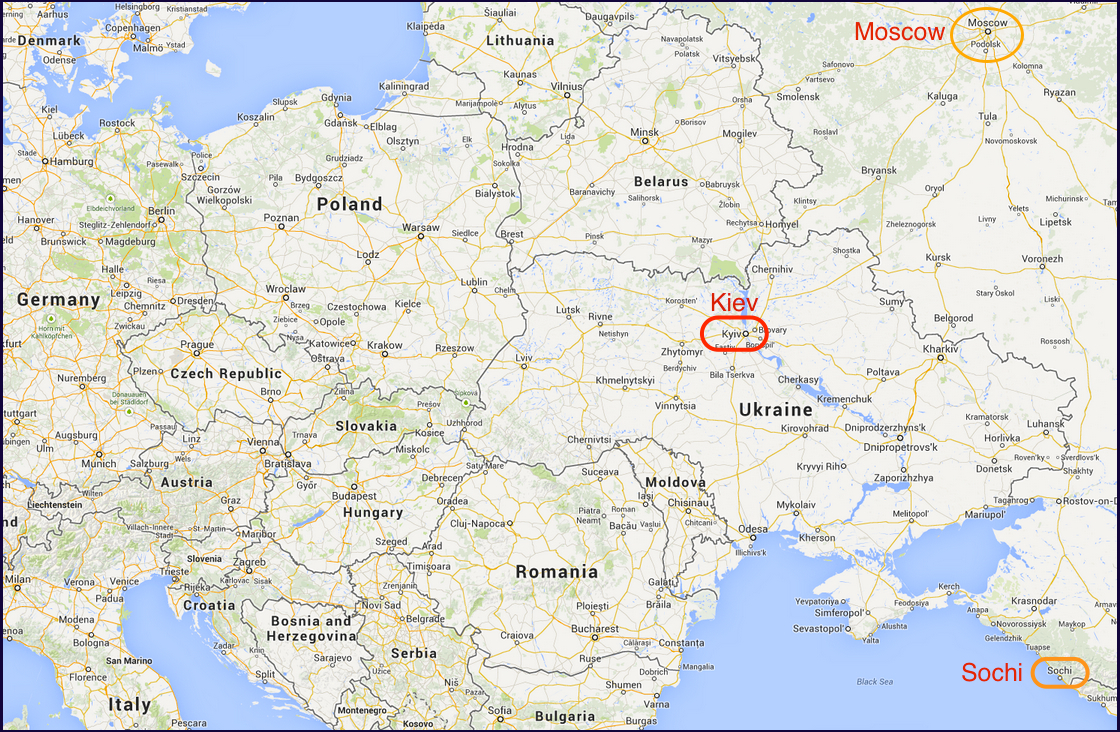Russia is winning the battle for Ukraine
And why not? Vladimir Putin has a lot more to lose in the bloody Kiev showdown than Europe or the U.S.


A free daily email with the biggest news stories of the day – and the best features from TheWeek.com
You are now subscribed
Your newsletter sign-up was successful
At least 25 people died in Kiev since Tuesday evening, when riot police started an offensive to clear a three-month-old protest encampment based in Maidan (Independence) Square. Nine of the confirmed deaths were police, one was a journalist, and the rest were protesters. It was the bloodiest day in the post-Soviet struggle for the political and economic allegiance of Ukraine, between Russia on one side and Western Europe on the other.
Russia is winning.
The situation in central Kiev is fluid, and the bloody police offensive won't quash the protests against President Viktor Yanukovich and his expedient push to align his country with Moscow. (It was Yanukovich's decision to pull out of a European Union trade pact in November, in favor of aid from Russia, that sparked the protest.) There will, unfortunately, almost certainly be more bloodshed, and some analysts (including Poland's prime minister) are warning of a civil war between the western part of Ukraine and the Russia-looking eastern and southern parts.
The Week
Escape your echo chamber. Get the facts behind the news, plus analysis from multiple perspectives.

Sign up for The Week's Free Newsletters
From our morning news briefing to a weekly Good News Newsletter, get the best of The Week delivered directly to your inbox.
From our morning news briefing to a weekly Good News Newsletter, get the best of The Week delivered directly to your inbox.
In the West, this looks like a pretty clear case of Ukrainians fighting for Western-style economic and political freedoms against the country's traditional imperial oppressor, Russia — now personified in Russian President Vladimir Putin. After fruitful talks between Yanukovich and his political opponents, which led to the January resignation of pro-Moscow Prime Minister Mykola Azarov and protesters starting to dismantle their barricades over the weekend, Putin apparently stepped in again.
For months, "Yanukovich had repeatedly pledged not to use force to disperse protesters," but after meeting with Putin at the opening of the Winter Olympics in Sochi, "he had clearly changed his mind," say Andrew Higgins and Andrew E. Kramer in The New York Times. On Monday, while Ukrainian protesters were meeting with German Chancellor Angela Merkel to ask for assistance, Putin "threw a new financial lifeline to Mr. Yanukovich's government by buying $2 billion in Ukrainian government bonds."
Russia had suspended its financial support for cash-strapped Ukraine after Azarov's resignation.
The hundreds of thousands of Ukrainians who've gathered in Maidan Square are "often bearing the flags of the United States and European Union — symbols of their desire for a closer relationship with the West and a move away from the seemingly inescapable grasp" of Putin and his "puppet," Yanukovich, says Ben Carnes, communications director for Rep. Trent Franks (R-Ariz.), in USA Today. But "Ukrainians have often displayed a voracious and specific appetite for the sort of liberal democracy delineated by the American Founders." Carnes adds some historical context:
A free daily email with the biggest news stories of the day – and the best features from TheWeek.com
Ukraine's last taste of independence came in 1917. Resistance was not far behind. In 1921, the nation was assimilated into the Soviet Union. A few years after this brief brush with independence, Joseph Stalin's "Great Purge" began; thousands of members of the Ukrainian intelligentsia who endorsed Ukrainian sovereignty were exiled or killed. Within the same decade, unconscionable Soviet policies targeting Ukraine led to one of the darkest chapters of modern history and the deaths of as many as 7.5 million Ukrainians — dubbed the "Holodomor." [USA Today]
The inference is clear: Russia is once more trying to smother Ukraine's struggle for freedom. Carnes makes an explicit pitch: "America has a moral obligation to stand unwaveringly with the Ukrainian people."
That's a compelling narrative, and it undoubtedly rings true for at least some Ukrainians. But other Ukrainians would rather stick with their neighbor to the east, and Russia is not only holding stronger cards in this fight but also has more to lose than the U.S. or Western Europe. So why does Russia want to keep Ukraine in its sphere of influence? First, there's geography. Ukraine isn't merely in Eastern Europe — it's the easternmost flank:

Between Ukraine — which was part of the Soviet Union — and Western Europe are the former Soviet satellite states Poland, the former Czechoslovakia, and Hungary. "For Russia, retaining its influence over a former Soviet republic with 46 million people is nearly essential for the country to maintain its geopolitical influence," says Andrew Rafferty at NBC News. And it is exercising that influence in the Ukraine through a democratically elected president, Yanukovich, and what amounts to legal bribery.
That is meddling with a sovereign nation, but imagine if Mexico decided to align itself economically and politically with, say, China. It may be nice to think the U.S. would stand back and let Mexico decide what's best for its people, but that wouldn't be what history indicates would happen. Think Cuba — still a sore spot 25 years after the fall of the USSR — and Nicaragua, the focus of a U.S.-sponsored guerrilla war in the 1980s.
That doesn't excuse Russia's hardball geopolitics, which apparently extends to encouraging or coercing Yanukovich to use violence to end the months-long protest. And Putin's blaming the U.S. for propping up the anti-Yanukovich protesters — Washington is trying to tell "the authorities of a sovereign state what they should do next and how they should do it," says Russia's state-run RIA Novosti — is comically transparent deflection.
But it helps explain why Putin is offering Yanukovich a sweeter deal than the EU, including heavily discounted natural gas and more generous loan agreements. Keeping Ukraine in Russia's camp is apparently so important to Putin that he is fine with photos of Kiev burning and tales of dead protesters knocking his prized Sochi Olympics off the front page of newspapers. We'll find out soon how important Ukraine is to Western Europe and the U.S. — and, perhaps, to the Ukrainian people.
Peter has worked as a news and culture writer and editor at The Week since the site's launch in 2008. He covers politics, world affairs, religion and cultural currents. His journalism career began as a copy editor at a financial newswire and has included editorial positions at The New York Times Magazine, Facts on File, and Oregon State University.
-
 ICE’s facial scanning is the tip of the surveillance iceberg
ICE’s facial scanning is the tip of the surveillance icebergIN THE SPOTLIGHT Federal troops are increasingly turning to high-tech tracking tools that push the boundaries of personal privacy
-
 ‘My donation felt like a rejection of the day’s politics’
‘My donation felt like a rejection of the day’s politics’Instant Opinion Opinion, comment and editorials of the day
-
 Trump wants a weaker dollar but economists aren’t so sure
Trump wants a weaker dollar but economists aren’t so sureTalking Points A weaker dollar can make imports more expensive but also boost gold
